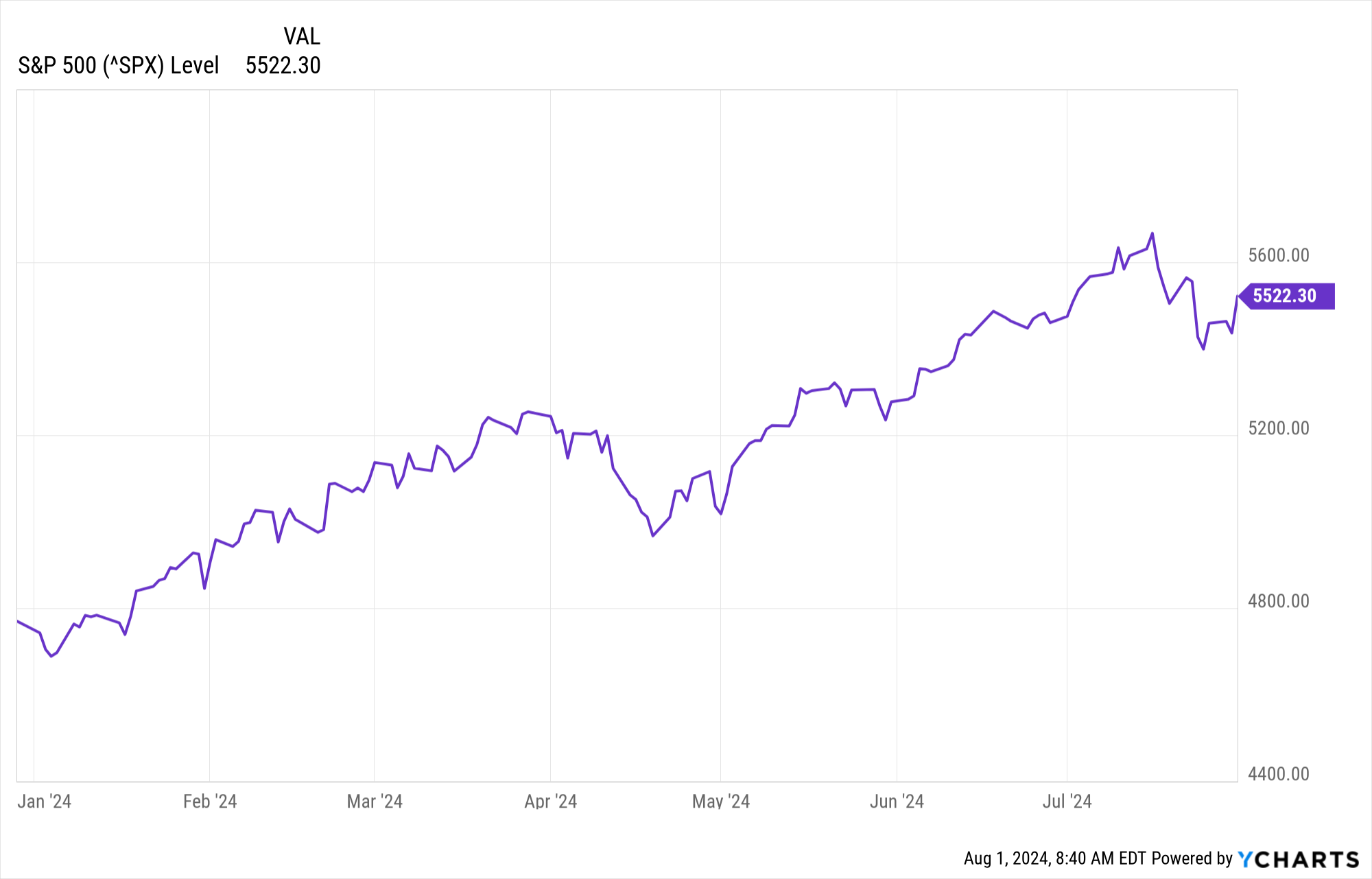Monthly Market Update
Submitted by TLWM Financial on August 1st, 2024
We started the second half of the year with a little market volatility as investors digested a number of significant headlines in July. The S&P 500 rallied strongly in the first half of the month before pulling back, but still closed about 1% higher for the month, and is now up almost 16% for the year. (YCharts)
We believe that the volatility we’re seeing in markets is a normal, and healthy, characteristic of a bull market and aren’t making any major changes to portfolios at this time given our base case that the economy avoids a meaningful recession, corporate earnings remain resilient, and stocks move moderately higher. Of course, our active approach means that as economic data evolves, we’ll be ready to make adjustments to our portfolio positioning.
This month we’re going to highlight three data points that reinforce our outlook that an imminent recession is unlikely.
- Economic Growth: 2nd quarter US GDP growth was better than expected coming in at 2.8% on the strength of consumer spending. We believe that it will be important to keep a close eye on the consumer. (YCharts)
- Earnings: We’re still early in the Q2 earnings season, but the data so far has been solid with 78% of companies in the S&P 500 beating earnings expectations (with 41% of companies reporting). We continue to feel that it’s important to see steady earnings growth particularly given current valuations. (FactSet)
- Inflation: A number of data points over the past month continued to show an improving trend in inflation. This reinforces the expectation that the Fed will likely cut rates for the first time in September.
We will continue to watch for cracks in each of these areas as we move forward, but as we indicated above, we currently have portfolios positioned for growth; however, we’ll be ready to make adjustments as needed.
As always, please don’t hesitate to reach out if you have any questions and feel free to pass this email along to any friends, family, or colleagues that you feel would benefit.
Sincerely,
Your Team at TLWM
* Investment advice offered through TLWM, LLC., a registered investment advisor.
* The Standard & Poor's 500 (S&P 500) is an unmanaged group of securities considered to be representative of the stock market in general. You cannot invest directly in this index.
* The Standard & Poor’s 500 (S&P 500) is an unmanaged index. Unmanaged index returns do not reflect fees, expenses, or sales charges. Index performance is not indicative of the performance of any investment.
* The 10-year Treasury Note represents debt owed by the United States Treasury to the public. Since the U.S. Government is seen as a risk-free borrower, investors use the 10-year Treasury Note as a benchmark for the long-term bond market.
* Government bonds and Treasury Bills are guaranteed by the U.S. government as to the timely payment of principal and interest and, if held to maturity, offer a fixed rate of return and fixed principal value. However, the value of fund shares is not guaranteed and will fluctuate.
* Corporate bonds are considered higher risk than government bonds but normally offer a higher yield and are subject to market, interest rate and credit risk as well as additional risks based on the quality of issuer coupon rate, price, yield, maturity, and redemption features.
*Credit risk can be a factor in situations where an investment’s performance relies on a borrower’s repayment of borrowed funds. With credit risk, an investor can experience a loss or unfavorable performance if a borrower does not repay the borrowed funds as expected or required. Investment holdings that involve forms of indebtedness (i.e. borrowed funds) are subject to credit risk.
* Typically, the values of fixed-income securities change inversely with prevailing interest rates. Therefore, a fundamental risk of fixed-income securities is interest rate risk, which is the risk that their value will generally decline as prevailing interest rates rise, which may cause your account value to likewise decrease, and vice versa. How specific fixed income securities may react to changes in interest rates will depend on the specific characteristics of each security. Fixed-income securities are also subject to credit risk, prepayment risk, valuation risk, and liquidity risk. Credit risk is the chance that a bond issuer will fail to pay interest and principal in a timely manner, or that negative perceptions of the issuer’s ability to make such payments will cause the price of a bond to decline.
* Opinions expressed are subject to change without notice and are not intended as investment advice or to predict future performance.
* Economic forecasts set forth may not develop as predicted and there can be no guarantee that strategies promoted will be successful.
* Past performance does not guarantee future results. Investing involves risk, including loss of principal.
* You cannot invest directly in an index.
* Consult your financial professional before making any investment decision.
* Stock investing involves risk including loss of principal.
* This document is solely for informational purposes. Advisory services are only offered to clients or prospective clients where TLWM Financial and its representatives are properly licensed or exempt from licensure.
* No strategy ensures a profit or protects against a loss.

